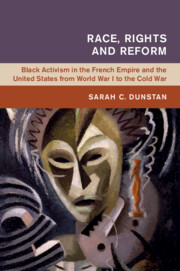 Race, Rights and Reform
Race, Rights and Reform Published online by Cambridge University Press: 01 March 2021
This chapter focuses on the critical moments in which institutional Communism as well as Marxist thinking brought activists and thinkers from the French Empire and the United States into contact as they fought to gain rights within their respective national contexts. Disenchanted with the promises of Wilsonian self-determination and the gap between the promise and reality of Republican democracy, many black activists theorized their oppression in Marxist terms, expanding that political theory to incorporate race. Moreover, at various moments the Communist International (Comintern) and the national Communist Parties such as the Parti Communiste Français and the Communist Party of the United States of America offered financial, institutional and rhetorical support that brought black activists together. It brings together Comintern documents from the Russian State Archives of Sociopolitical History into dialogue with both French and American communist and anti-imperial publications such as Le Paria, Crusader, Le Cri des négres, and the Negro World as well as the police surveillance records such as those from the Paris Police Prefecture and the Military Intelligence Records at the National Archives in Washington, DC.
To save this book to your Kindle, first ensure [email protected] is added to your Approved Personal Document E-mail List under your Personal Document Settings on the Manage Your Content and Devices page of your Amazon account. Then enter the ‘name’ part of your Kindle email address below. Find out more about saving to your Kindle.
Note you can select to save to either the @free.kindle.com or @kindle.com variations. ‘@free.kindle.com’ emails are free but can only be saved to your device when it is connected to wi-fi. ‘@kindle.com’ emails can be delivered even when you are not connected to wi-fi, but note that service fees apply.
Find out more about the Kindle Personal Document Service.
To save content items to your account, please confirm that you agree to abide by our usage policies. If this is the first time you use this feature, you will be asked to authorise Cambridge Core to connect with your account. Find out more about saving content to Dropbox.
To save content items to your account, please confirm that you agree to abide by our usage policies. If this is the first time you use this feature, you will be asked to authorise Cambridge Core to connect with your account. Find out more about saving content to Google Drive.